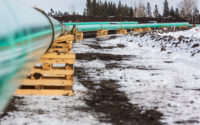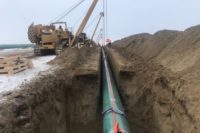Pipeline politics are taking a toll on the Canadian economy, with billions in lost revenue from steep discounts in domestic crude oil prices as major projects face long delays, a new financial report finds.
Holdups in Kinder Morgan’s Trans Mountain expansion, Enbridge’s Line 3 replacement, and TransCanada’s Keystone XL are effectively costing Canada more than $12.3 billion a year in lost sales, or 0.75% of total GDP, according to the analysis by Toronto-based Scotiabank.
As a result, Western Canada’s rich oil fields are producing far more crude than can be transported to the U.S. and other markets.
Canadian oil producers will need Line 3 and either Keystone XL or Trans Mountain to move forward in the next few years or the country will face “indefinite pipeline constraints” and billions annually in lost revenue, contends Jean-François Perrault, Scotiabank chief economist. “Pipeline approval delays have imposed clear, demonstrable and substantial economic costs on the Canadian economy.”
At this point, the earliest Canada could close the gap between oil production and pipeline capacity would be by 2020.
That estimate depends on both the Keystone XL and Trans Mountain projects being completed by that time. But Kinder Morgan recently delayed Trans Mountain, which would funnel oil from Alberta across British Columbia to the coast, to 2020 from 2019 previously.
Citing impacts to coastlines and greenhouse gas emissions, British Columbia officials are threatening to bar any additional oil from being pumped and transported across the province, a move that would effectively kill the $5.9-billion Trans Mountain project.
Alberta Premier Rachel Notley has retaliated by closing the borders to wine from neighboring British Columbia and pulling out of negotiations to buy power from B.C.
Canada’s pipeline shortage came to a head last November, when TransCanada’s Keystone pipeline sprung a leak and was temporarily shut down, Perrault notes.
Even after it reopened, federal regulators ordered a 20% reduction in the volume of oil pumped through the pipeline.
According to Perrault, the economic impact may ease with plans to ship more oil by train, which will reduce Canada’s annual revenue loss to $8.4 billion. “The elevated discounts come with a steep economic cost, and represent to a large degree a self-inflicted wound,” he writes.
Mackenzie Radan, spokesman for the office of the Minister of Natural Resources, says new pipeline project rules have been put in place to protect the environment and the rights of indigenous peoples.
Projects “will generate significant economic benefits,” he says. “We will not tolerate unnecessary delays on federally approved pipeline projects.”





Post a comment to this article
Report Abusive Comment